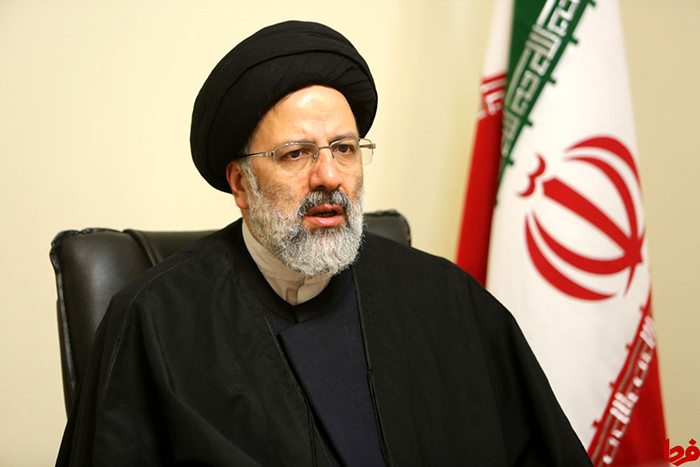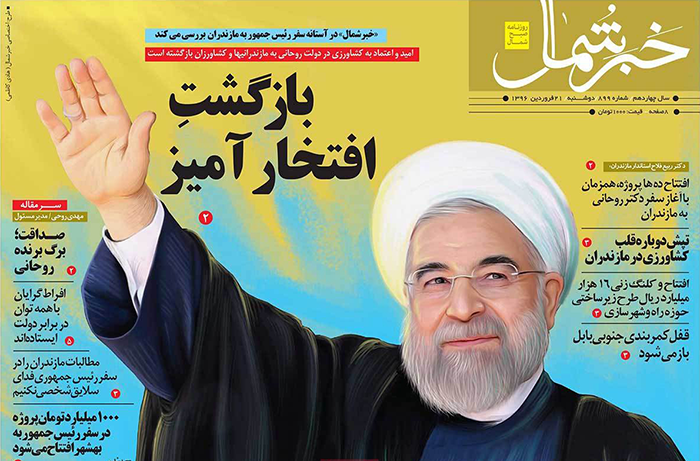Candidates, issues in Iran's presidential election
Developing a “Resistance Economy” remains the main theme
Developing Just LeadershipZafar Bangash
Sha'ban 04, 1438 2017-05-01
News & Analysis
by Zafar Bangash (News & Analysis, Crescent International Vol. 46, No. 3, Sha'ban, 1438)
Islamic Iran is heading for its 12th presidential election since the victory of the Islamic revolution in 1979. Six candidates have been approved for the May 19 poll.
The people of Iran will head to the polls on May 19 to elect a new president or re-elect the incumbent, Hassan Rouhani. This will be the twelfth presidential election since the victory of the Islamic Revolution in January/February 1979. Elections will also be held for city and village councils.
Islamic Iran is among few countries in the region that has consistently held elections for the president, parliament, and local councils without interruption since 1979. Even when faced with an imposed war (1980–1988) and the assassination of the president and prime minister (August, 1981), the Islamic Republic did not suspend the constitution or the electoral process.
By the closing day of the registration deadline (April 15), a total of 1,636 candidates had submitted their names to the Interior Ministry to contest the polls. Among the candidates were also 137 women. A spokesperson for the Guardian Council, Abbas Ali Kadkhodaei, said most candidates would not be able to meet the requirements for the important post of president as stipulated in the constitution. He said the post of president is “very important” and candidates must meet stringent requirements. The Guardian Council is tasked with reviewing qualifications of all candidates for the post of president.
On April 20, the Interior Ministry released the following list in alphabetic order that had been vetted and approved by the Guardian Council:
1. Mostafa Aqa-Mirsalim;
2. Mostafa Hashemi-Taba;
3. Eshaq Jahangiri;
4. Mohammad-Baqer Qalibaf;
5. Hassan Rouhani; and
6. Seyyed Ebrahim Raeisi.
Given Iran’s stringent checks and balances, a vagabond like Donald Trump would never be elected president. In the US, candidates — for president or Congress — are beholden to vested interests — big corporations, banks, and the Zionist lobby — and serve their interests rather than those of the people who elect them. Not surprisingly, it is widely acknowledged that the US has the best democracy money can buy!
Islamic Iran has a unique political system. There are no political parties like in the so-called Western democracies where candidates must toe the party line or be gone. There are, however, political factions and groups that operate in a flexible manner. For instance, a candidate elected from a particular group, especially to parliament may not support that group on all issues. There is considerable leeway for Majlis members to vote according to their conscience.
Before every election, members of different groups try and seek the support of others to enhance the chances of their preferred candidate. Each group also tries to unite behind the candidate it believes has the best chance of winning.
Political commentators have identified more than 240 different political groups in Iran but they are mainly divided into three broad categories: the Principlists (from the word Principle), Reformists, and Moderates.

As the name suggests, the Principlists emphasize adherence to the principles and ideals of the Islamic Revolution and want an administration that would defend Islamic values. While every group in Iran claims to be following the “Line of the Imam” (Imam Khomeini), the Principlists perhaps come closest to the Imam’s political jurisprudence, which is unequivocal on politics being inseparable from religion. The Imam’s thought also lays down that only muttaqi people, that is, those who are faithful to Islamic values and live by them, should run the country.
The Principlists also emphasize an independent foreign policy free from the coercive tactics of the imperialists and Zionists. They insist that the Islamic Republic must pursue a firm policy based on the principles of the Islamic Revolution in dealing with international affairs.
On the economy, the Principlists want minimum government interference limiting its role to the extent mentioned in the constitution. They believe that the people are the best judges of what is good for them and can decide for themselves. They want to guarantee to every individual the basic necessities of life but do not want to regulate the economy too much. They are also averse to globalization of the economy rightly pointing out that globalization only benefits the predatory Western powers that already enjoy undue advantage due to unfair trade practices.
It would, however, be simplistic to assume that the Principlists are a monolithic group; even within this broad category, there are a number of different factions. For the upcoming presidential elections, different factions have united to form what they call the Popular Front of Islamic Revolution Forces. There is widespread belief that they would support Hujjat al-Islam Seyyed Ebrahim Raeisi who secured the largest number of votes in a short list of ten candidates they had chosen and voted on.
Interestingly, Muhammed Baqer Qalibaf, also on the Principlists’ short list, came fourth among the top five candidates but he has been approved by the Guardian Council to run for president. This would be Qalibaf’s third run at the presidency. He currently serves as Tehran’s mayor. Before moving into politics, he had served as chief of the Revolutionary Guards air force as well as police chief.
The other major political faction in Iran is the group called Reformists. This became popular during the presidency of Mohammad Khatami in 1997. Previously, these people were labeled “left wing.”
The Reformists say they defend the democratic rights of the people under the constitution. They also say they will solve people’s problems caused as a result of bureaucratic hurdles or due to some structural reasons in the system. They are also much more open to international interaction, including with the Western imperialist powers. Their argument is that they can hold their own against these powers.

Iran’s current administration led by President Rouhani calls itself Moderate. It seeks to distinguish itself from both the Principlists and Reformists although it is much closer to the latter. Interestingly, in the 2016 parliamentary elections, several cabinet ministers in the current administration as well as its supporters who won seats belonged to both camps — Principlists and Reformists. This again underscores the fact that political lines are not drawn rigidly in Iran.
Clearly, every incumbent administration has to run on its record. This is no different for President Rouhani’s administration. Several issues are involved of which the economy is at the top, largely because of the unjust and illegal sanctions imposed by the US. The incumbent administration defends its performance by claiming to have tamed the 40% inflation. It also refers to its success in resolving Iran’s nuclear issue through the Joint Comprehensive Plan of Action (JCPOA) with the P5+1 powers but its critics say the country got a raw deal. No doubt, this issue will also be hotly debated during the election campaign.
That economy will be front and centre was apparent from how Hujjat al-Islam Raeisi, considered the main challenger to President Rouhani, framed it. In a meeting with entrepreneurs and representatives from the private sector in Tehran on April 18, he criticized the current economic situation in the country. He also described the living standards of the people as “unacceptable.” He vowed to develop a strong economy if elected president.
“If our economy is not fragile, structures would be amended and we would become resistant against sanctions and threats and people’s business would boom. A strong economic management has the first word in this regard,” he said. He went on to describe the levels of efficiency, economic growth, industrial production and job creation as “unacceptable.”
Laying stress on the ingenuity of the Iranian youth, he said all strategies must involve them and focus on job creation in order to “witness economic growth.” Raeisi also criticized the performance of the current administration, saying it had only used “30% of the capacity of the country’s experts” and failed to make use of this capacity that would lead to independence.
Eshaq Jahangiri, one of the vice presidents in the Rouhani-led administration, called for creating one million jobs a year. He said unity was needed to overcome challenges like unemployment. Jahangiri had served as minister of industry, mines, and trade from 1997 to 2005 and before that as governor of Isfahan province. His candidacy once again underscores the fact that there are no rigid political lines in Iran’s system.
Developing a strong economy that he calls the “Resistance Economy” has also been a constant theme in Imam Seyyed Ali Khamenei’s speeches. As guide of the revolution, his intervention and advice at critical junctures has served the Islamic Republic well. This was again apparent on April 19 while addressing military commanders who had gathered at the Rahbari.
“Browbeating is the modus oper-andi of big powers,” alluding to recent threats from the US. “The worst situation for a country comes about when its authorities are intimidated by the enemy’s threats and bullying tactics,” the Rahbar said. “The people [however] are standing upright.” He said that people’s resistance against such threats and plots had thwarted the enemy’s [imperialists and Zionists] plots on numerous occasions.
“Neither the US nor bigger [entities] than that can do anything in the face of an establishment, which is bonded with its people, likes its people, and is liked by them,” the Rahbar added. He went on to emphasize the importance of people’s participation in the elections saying, “An election of such nature would lend much security to the country.”
Guided by such a leader, the Islamic Republic is in safe hands because it relies on Allah (swt) for protection and support. No worldly power can destabilize it or cause it harm. Its survival, indeed remarkable growth and development, in such a hostile environment for 38 years testifies to its resilience and complete reliance on Allah (swt), the only superpower in the world.

